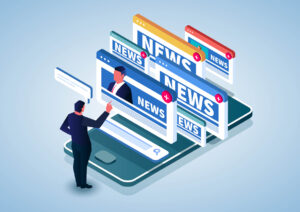Public speaking lessons from Dr. Martin Luther King Jr.
One of most eloquent speakers, King is remembered for his ability to control a venue with the simple power of his voice. Here are a few reasons why he was so successful.

Editor’s note: This article is a re-run as part of our countdown of top stories from the past year.
Each year, we remember the legacy of a man who led the Civil Rights Movement using the power of words—Dr. Martin Luther King Jr.
His “I Have a Dream” speech is ranked as one of the most change-provoking speeches of the twentieth century. King’s ability to shift the hearts and minds of people by using effective dialogue is a testament to the profound impact public speaking can have on an audience.
Powerful delivery is essential for the successful conveyance of any idea, product or service. No matter if it’s for a conference, presentation or broadcast interview, here are four guidelines to follow before setting onto any podium:
1. Positivity – Positive language is powerful because it can invoke a feeling of inspiration from your audience. A positive message gives your audience the promise of a better future.
In “I Have a Dream,” King used positive language to motivate change:
But we refuse to believe that the bank of justice is bankrupt. We refuse to believe that there are insufficient funds in the great vaults of opportunity of this nation. And so, we’ve come to cash this check, a check that will give us upon demand the riches of freedom and the security of justice.
2. Connection – If you work to develop a better understanding of your audience and their goals, you can create a strong bond with them. First, determine what you have in common with your audience, then create a sense of unity and purpose with how you address them.
King made a direct connection with his audience by highlighting two common American values—freedom and religion:
And when this happens, and when we allow freedom ring, when we let it ring from every village and every hamlet, from every state and every city, we will be able to speed up that day when all of God’s children, black men and white men, Jews and Gentiles, Protestants and Catholics, will be able to join hands and sing in the words of the old Negro spiritual: Free at last! Free at last! Thank God Almighty, we are free at last!
3. Repetition – Determine the foundation of your message and use a simple, but key phrase throughout to drive home your point. This makes your position clear and easy for the audience to follow along with. Consider too, the delivery of the repeated word. King repeats, “I have a dream” at the beginning of several phrases—making it clear, and almost expected, for his audience.
I have a dream that one day this nation will rise up and live out the true meaning of its creed: “We hold these truths to be self-evident, that all men are created equal.”
I have a dream that my four little children will one day live in a nation where they will not be judged by the color of their skin but by the content of their character.
4. Projection – Stand up straight and project your voice by speaking from the diaphragm, not the throat. This ensures that your voice is grounded, which allows you to project without straining or becoming hoarse.
Silence can be equally as important. Be sure to take long pauses, and avoid words like “um,” “ah,” or “like.” King honed his experience as a preacher in order bring a rich tone and steadiness to speaking. He spoke slow and exerted confidence and intelligence on the issues he addressed.
Read King’s full “I Have a Dream” speech here. Watch the video version here.
Jordan Brueckner is an account executive at Cognito Media. A version of this story originally appeared on the firm’s blog.
(Image via)







We can learn and benefit by seeing not just what Dr. King said but also what he didn’t say.
HE DIDN’T SAY THERE’S NO PROGRESS. On the contrary, his very first sentence points out progress, the huge crowd being “the greatest demonstration for freedom in the history of the nation.”
HE DIDN’T JUST COMPLAIN OF VAGUE UNFAIRNESS but specified a problem people can see and try to correct: “the Negro lives on an island of poverty in the midst of a vast ocean of material prosperity.”
HE DIDN’T JUST SAY IT’S OUR PROBLEM, which people in power might not care about as much, but pointed out that “many of our white brothers. . .have come to realize that their destiny is tied up with our destiny,” and “until the Negro is granted his citizenship rights, the whirlwinds of revolt will continue to shake the foundation of our nation.”
Cautiously, PR executives who today defend large organizations can point out that just as Hitler and others once said that if we need money, let’s take it from the Jews because they have plenty of money, some political leaders today are saying let’s take it from ”the millionaires and billionaires.” Gengis Khan and some African power brokers said let’s take it from the white people, and some Western leaders are still saying let’s take it from the Arabs.
HE DIDN’T ANNOUNCE AN UNSPECIFIED DREAM but told what it is, that “this nation will rise up” to the creed, “all men are created equal.”
HE DIDN’T JUST ASK FOR HIMSELF but also for “my four little children” and so that “all of God’ children wll be able to sing my country tis of thee. . . let freedom ring!”
HE DIDN’T FAVOR SETTLING FOR WHAT WE CAN GET but said “this is no time to take the tranquilizing drug of gradualism.” The writer’s exceptionally strong Cognito PR firm has produced success in the U.S, Asia and Europe for accounts by using persuasive communications to show opportunities that are not just maybe but may be now and soon.
HE DIDN’T DESCEND TO EXCESS NEGATIVISM by saying “I had a nightmare” that such-and-such is true and some other such-and-such also is also true but ended with a hope “Let freedom ring,” and a vision that all Americans will eventually be able to sing the old spiritual “Free at last! Free at last! Thank God Almighty, we are free at last!”
This is exactly why he is a great world changer. The power of words, the ability to use them in the right context, is a driving force for change and progress.
He speaks eloquently.